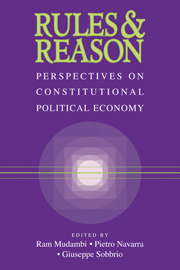Book contents
- Frontmatter
- Contents
- Foreword
- Preface and Acknowledgments
- List of Contributors
- 1 Constitutional Issues in Modern Democracies
- PART I CONSTITUTIONAL THEORY
- 2 On Writing a Constitution
- 3 Constitutional Order and Economic Evolution: Competitive and Protectionist Interests in Democratic Society
- 4 The Efficacy of Arbitrary Rules
- 5 Constitutional Political Economy and Civil Society
- 6 The Constitutional Conflict between Protecting Expectations and Moral Evolution
- 7 Ideological Competition and Institutions: Why “Cultural” Explanations of Development Patterns Are Not Nonsense
- PART II ELECTORAL SYSTEMS AND INSTITUTIONS
- PART III CONSTITUTIONAL ISSUES FOR A FEDERAL STATE
- Index
6 - The Constitutional Conflict between Protecting Expectations and Moral Evolution
Published online by Cambridge University Press: 05 June 2012
- Frontmatter
- Contents
- Foreword
- Preface and Acknowledgments
- List of Contributors
- 1 Constitutional Issues in Modern Democracies
- PART I CONSTITUTIONAL THEORY
- 2 On Writing a Constitution
- 3 Constitutional Order and Economic Evolution: Competitive and Protectionist Interests in Democratic Society
- 4 The Efficacy of Arbitrary Rules
- 5 Constitutional Political Economy and Civil Society
- 6 The Constitutional Conflict between Protecting Expectations and Moral Evolution
- 7 Ideological Competition and Institutions: Why “Cultural” Explanations of Development Patterns Are Not Nonsense
- PART II ELECTORAL SYSTEMS AND INSTITUTIONS
- PART III CONSTITUTIONAL ISSUES FOR A FEDERAL STATE
- Index
Summary
The Possibility of New Moral Insights That Necessitate Redistribution
The main point of this chapter is simple: Unless the process that generates a constitution is perfect, there should be provision for the possibility of changing the constitution. It is true that the stability provided by constitutions is valuable. By limiting the opportunities for transient majorities to redistribute, constitutions protect property rights. The resulting stability promotes efficiency by reducing rent seeking. But as valuable as stability is, it is not lexically more valuable than the chance to incorporate new moral understandings into a constitution. And when a society perceives the need to incorporate a new moral understanding into its constitution, a disappointment of pre-existing expectations is likely to be necessary.
Perhaps the point seems so simple that it does not even need to be stated. How could anyone doubt that it will sometimes be appropriate to change a constitution and that some will lose in the process? However, associated issues are complex enough that some elaboration is warranted.
The first point to be made is that disagreement about what constitutes an improved understanding of a moral imperative is nearly inevitable at the time when the new understanding is emerging. History reveals that such improvements in our understanding do occur and that they are controversial when they occur.
Three hundred years ago virtually no one questioned the propriety of slavery. Even John Locke, that most articulate advocate of human freedom, invested in slaves.
- Type
- Chapter
- Information
- Rules and ReasonPerspectives on Constitutional Political Economy, pp. 97 - 106Publisher: Cambridge University PressPrint publication year: 2001



